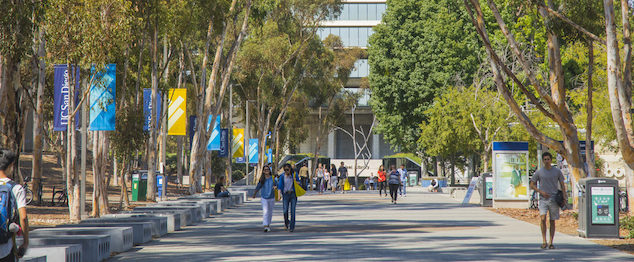News
UC’s grad student researchers seek union link with auto workers
 Students at the campus of the University of California in San Diego. (Photo: Kapi Ng, via Shutterstock)
Students at the campus of the University of California in San Diego. (Photo: Kapi Ng, via Shutterstock)About 17,000 graduate student researchers calling themselves Student Researchers United (SRU) at 10 University of California campuses are seeking to form a union with the United Auto Workers, a campaign that began in early 2020. UC management is not wholly on board with this move of unrepresented employees.
Ryan King, a representative for the UC’s Office of the President, declined a reporter’s request for an interview, but issued the following statement.
“The University of California believes our graduate student researchers contribute to the University’s key research mission, creating new knowledge. We support our employees’ right to union representation. UC is in ongoing discussions with the United Auto Workers and the Public Employment Relations Board (PERB) regarding the final composition of this new bargaining unit.”
According to UC’s King: “The University recognizes that the majority of individuals in the petition who should comprise the new bargaining unit: graduate student researchers who are hired as employees to work under the direction of the University. However, there are differences in perspectives between UC and the UAW regarding other individuals included in the petition who are not University employees as defined by the Higher Education Employer-Employee Relations Act.”
Maya Holay, 26, is a fellow in cancer and vaccination research in the NanoEngineering Department at UC San Diego. “Ultimately, we are trying to form a union by and for graduate student researchers to win benefits and job protections,” she said in a phone interview.
This is not your grandfather’s UAW of the postwar era when Detroit was the car making capital of the world.
Currently, the UAW represents about 80,000 academic workers nationally, from graduate student workers to teaching assistants, postdoctoral scholars, research and clerical workers at Harvard, Columbia, Wayne State and the University of Washington and other institutions of higher education.
Back in the Golden State, on May 24, 2021, the SRU filed 12,000 union authorization cards with the PERB to petition to unionize and bargain collectively with UC for improved benefits, pay and standards. On Aug. 4, the PERB verified the signatures and confirmed the validity of the petitioners’ bid to unionize.
However, UC filed a PERB letter on Sept. 2, 2021, that recognized some but not all of the SRU employees who had petitioned the PERB. The agency’s letter of Sept. 8, 2021, disputes UC’s interpretation of the petition for the SRU to form a union.
“It appears that the University sought to recognize only part of UAW’s petitioned-for unit,” according to the PERB missive. This was not one of the choices available to the University. The University was required to either recognize the petitioned-for unit, or deny recognition based on the reasons enumerated under PERB Regulation 51080(d)(3). Because the University failed to recognize the petitioned-for unit, PERB must treat the University’s September 2, 2021 response as a denial of recognition pursuant to PERB Regulation 51080(d).”
Tarini Hardikar, 25, is a graduate student researcher in the Chemistry Department at UC Berkeley. Like Holay at UCSD, Hardikar, whose work focuses on electronic structure theory, took an active role in the SRU union organizing committees that began on each campus in early 2020. “Forming a union is the best way to ensure equity in the workplace,” she said by phone.
Meanwhile, the SRU will hold a strike vote beginning Wednesday, Nov. 10, and ending November 19. If they do vote to strike, or withhold their labor from the employer, it is unclear if the UAW would be able to help the strikers financially from a union strike fund, as the SRU employees, currently unrepresented, have no contract in place with their employer now.
Holay laments UC’s stance. “It’s frustrating to know that our democratic rights are not being recognized,” she said.
Want to see more stories like this? Sign up for The Roundup, the free daily newsletter about California politics from the editors of Capitol Weekly. Stay up to date on the news you need to know.
Sign up below, then look for a confirmation email in your inbox.

Leave a Reply